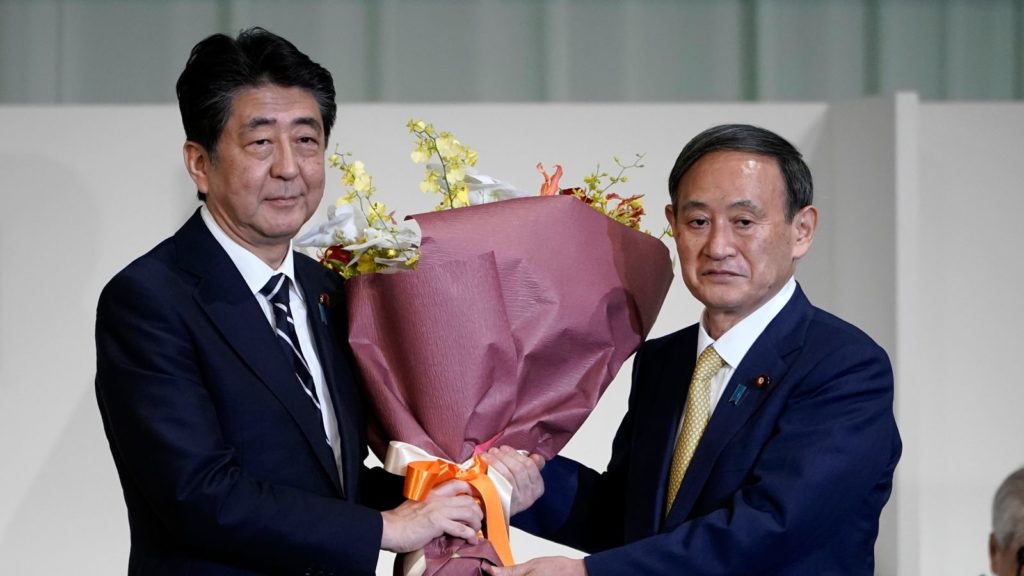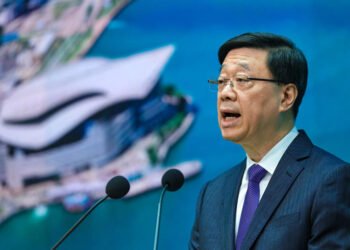Japan’s parliament has elected Yoshihide Suga as the country’s new prime minister, following the resignation of Shinzo Abe.
After winning the leadership of the governing party earlier, the vote confirms his new position. A close ally of Mr Abe, the new prime minister is expected to continue his predecessor’s policies. Shinzo Abe announced his resignation last month citing ill health.
Mr Abe held his final cabinet meeting before the election and told reporters he was proud of his achievements during his nearly eight years in power.
Mr Suga then easily won the vote for prime minister in the Diet, Japan’s lower house, where a coalition headed by his conservative Liberal Democratic Party (LDP) holds a majority.
Along with his new cabinet, he will later be ceremonially endorsed by the emperor at the Imperial Palace. The new prime minister is expected to keep many of Abe’s team in place when he announces his cabinet.
A veteran politician and long-time cabinet member, he takes the lead at a difficult time for the country. Like many other nations, Japan is struggling with the coronavirus pandemic which has caused the biggest economic slump on record following years of economic stagnations.
The world’s third-largest economy shrank a record 27.8 percent from April to June this year compared with the previous quarter due to pandemic-related lockdowns that were only relaxed in late May 2020.
The country is also dealing with a rapidly aging society, with nearly a third of the population older than sixty-five.
Mr Suga has served for years as Chief Cabinet Secretary, the most senior role in government after the prime minister. Unlike his predecessors, Suga does not come from a privileged background and rose to the top of the LDP without belonging to any of its powerful factions.
He has already promised to carry on much of the previous administration’s agenda, including the economic reform programme dubbed ‘Abenomics’.

He is also expected to push forward with his own initiatives, including bureaucratic reform, digitalisation, and helping Japan’s rural communities through policies on agriculture and tourism.
“Mr Suga’s election assures the continuity in all the major policy initiatives launched by Shinzo Abe,” Yuki Tatsumi, director of the Washington-based Stimson Center’s Japan programme, told reporters.
“What will be the greatest test for him is how well he fares as the public face of the Japanese government.
“While his ability as Mr Abe’s right hand man and his Chief Cabinet Secretary has been amply proven, his ability to lead the country as the top leader is largely untested, particularly in the area of foreign policy. How Suga can transition from supporting to the main actor will determine how well the leadership transition can be managed,” she added.
As the face of the Abe government, helming regular news conferences as its chief spokesman, Suga cut a rather resolute figure, but has attempted to portray a friendlier demeanour since he emerged as a frontrunner in the race to replace Abe.
Analysts say his insiders’ knowledge of the intricacies of Japan’s bureaucracy and skilful political deal-making from his long tenure as Abe’s righthand man, should help in the arduous challenges that lie ahead.
“Nobody has had as long a tenure as Suga. He knows everything. He knows how government works. He knows how sectionalism has previously prevented change. That is a great asset for him,” Kiyoaki Aburaki, managing director of BowerGroup Asia in Tokyo, told reporters.























